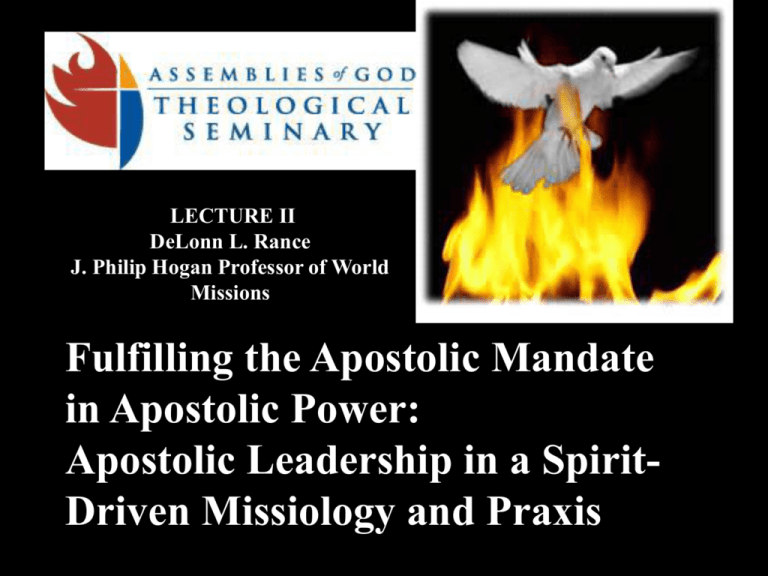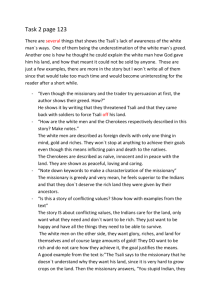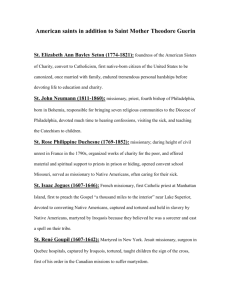Apostolic Leadership in a Spirit
advertisement

LECTURE II DeLonn L. Rance J. Philip Hogan Professor of World Missions Fulfilling the Apostolic Mandate in Apostolic Power: Apostolic Leadership in a SpiritDriven Missiology and Praxis Overview of the Inaugural Lecture • I seek to call the Church, the apostolic/ missionary people of God, to a Spirit-driven missiology that recognizes our need for dependence on the Spirit for direction, for empowerment and for fruit in the missionary enterprise—a missiology that does not just give lip service to the Spirit’s activity but depends on it in missional praxis, a missiology that seeks to fulfill the apostolic mandate in apostolic power. Core Values of a Spirit-driven Missiology • —the Lord fulfills mission through His Church by the direction and power of the Holy Spirit, —all members of the Church are responsible for the apostolic mandate to reach all peoples with the good news of the kingdom, Core Values of a Spirit-driven Missiology • —leadership equips the Church by creating space for supernatural encounter that is held to the standard of the Word in contextually appropriate ways, • —to be effective in missional praxis the church must paradoxically exert great effort while relying fully on the power of the Spirit, and • —to be reliant on the Spirit requires a commitment to prayer. THE APOSTOLIC MANDATE Gospel Church What is our purpose? What is God’s agenda? Mission THE THEOLOGICAL MANDATE Gospel Church Mission Where does the power come from? Is Christ central? Is this Christ’s ministry? Is it the creation of possibility out of impossibility by the Spirit? The Indigenous Church - Redefined • An indigenous church is a community of believers birthed in a specific context who are Spirit-driven (Spirit-led and Spirit-empowered) to accomplish God’s purposes for and through that community. Like the various churches described in the New Testament, particularly in Acts, these local and national communities of faith are to be Spiritgoverned, Spirit-supported and Spiritpropagated. God by his Spirit calls and equips local leaders to disciple and mobilize believers in the faith and to guide them in discerning and fulfilling the will of God for their community. The Indigenous Church - Redefined • The indigenous church is a responsible community that turns to the unlimited resources of the Spirit for its sustenance so as not to depend on the missionary, institutions, ministries, or agencies. It is a community of faith whose members are impassioned and empowered by the Spirit to reach their neighbors, their nation, and their world with the gospel. • Today much “good” is done in the name of missions, in the name of ministry, but unless it leads to revelation and reconciliation, to new life in Christ, it is not ministry; it is not missions. Are we willing to step out in faith in obedience to the voice of the Master and serve in the midst of the wind and the waves at the edge of missional chaos and allow the Holy Spirit to bring order, to make the impossible possible? • The missionary people of God must create space for the actions of the God of the impossible. The greatest miracle of all is a sinner saved by God’s amazing grace. May this be the generation of the apostolic/missionary people of God that experiences the fulfillment of the apostolic mandate in apostolic power. LECTURE II DeLonn L. Rance J. Philip Hogan Professor of World Missions Fulfilling the Apostolic Mandate in Apostolic Power: Apostolic Leadership in a SpiritDriven Missiology and Praxis • The apostolic mandate cannot be accomplished without apostolic leadership who operate in apostolic power, because God has chosen to communicate through people. 1. Apostolic Leadership Defined for a Spirit-Driven Missiology and Praxis Side Bar 1: “Apostolic” • - generic sense of being “sent,” commissioned for a for an identity, the Apostolic/Missionary people of God. Task of Apostolic leadership is to “prepare the missionary people of God for ministry” (Eph. 4:11-13), a ministry defined by God himself most clearly expressed by the Spirit in Christ in the incarnation, crucifixion, and resurrection. This same ministry is to be the ministry of the church in the power of the Spirit: a Spirit-driven missiology and praxis. Side Bar 2: Narrative • A story creates space, which invites encounter, dialog, and mutual sharing. In that space God speaks, guides, and gives vision (Nouwen as quoted in Job and Shawchuck, 1983:247). • Mission is a continuation of the narrative that began with the calling of Abraham and continues through the people of God under the leadership of the Holy Spirit (W. Shenk, 1993:12). • “Narrative theology as viewed from an evangelical perspective offers a creative and fruitful way to integrate the Bible’s affirmations about the mission of God with our understanding of mission theology and its multiple, dynamically-interacting horizons of text, community, and context” (Van Engen, 1996:44). LEADERSHIP FOR THE MISSION OF THE CHURCH • Bobby Clinton defines church leadership as: • a person with: the God-given capacity and • the God-given responsibility • to influence: • a specific group of God's people • toward God’s purpose for that group. • God is central, for all ministry is God’s ministry. Rance Reformulation of Church Leadership as in a Spirit-Driven Missiology and Praxis: • a person (team) with: • the God-given call (responsibility) and • the God-given Spirit empowerment (capacity) both natural and supernatural • To create “space” for the Spirit to influence: • a specific group of God's apostolic/ missionary people • toward God's missional purpose for that group. Misiones en Conjunto 2007 International Missionaries • Cross-Cultural Workers • Total Number of Missionaries 480 352 832 • Serving in 72 countries of the world • Approximately 95 missionaries serving in Muslim contexts. 2. Effective Leadership in a SpiritDriven Missiology and Praxis Core Competency for Apostolic Leadership in a Spirit-Driven Missiology and Praxis • The most important competency in ministry is the ability to discern the voice of the Spirit and be able to yield to Spirit empowerment (both natural and supernatural) in order to live in obedience to that voice. ELEVEN AREAS NECESSARY FOR EARLY CHURCH LEADERSHIP (Kornfield) • 1. DOING THEOLOGY • 2. DEVELOPING SOUND DOCTRINE AND THE ABILITY TO DISCERN AND REFUTE HERESY. • 3. DEVELOPING CLOSE INTERPERSONAL RELATIONSHIP BETWEEN TEACHERS AND LEARNERS. • 4. DEVELOPING SERVANT LEADERSHIP. (Generosity, even greater) • 5. DEVELOPING GODLY CHARACTER (E.G. LOVE, JOY, PEACE). • 6. DEVELOPING DEPENDENCE ON GOD (I.E. A WORSHIPING LIFESTYLE). • 7. DEVELOPING MINISTERIAL SKILLS (E.G. PREACHING, COUNSELING). • 8. DEVELOPING SPIRITUAL DISCIPLINES (E.G. PRAYING, SCRIPTURE READING). • 9. DEVELOPING SPIRITUAL GIFTS. • 10. GROWING IN CONSISTENTLY CHOOSING IN ACCORDANCE WITH GOD'S CHARACTER AND WILL. • 11. GROWING IN UNDERSTANDING AND PRACTICING MUTUAL SUBMISSION (INTERDEPENDENCE). Eleven Leadership Competencies • 1. DOING THEOLOGY • 2. DEVELOPING SOUND DOCTRINE AND THE ABILITY TO DISCERN AND REFUTE HERESY. • 3. DEVELOPING CLOSE INTERPERSONAL RELATIONSHIP BETWEEN TEACHERS AND LEARNERS. • 4. DEVELOPING SERVANT LEADERSHIP. • 5. DEVELOPING GODLY CHARACTER (E.G. LOVE, JOY, PEACE). Eleven Leadership Competencies • 6. DEVELOPING DEPENDENCE ON GOD (I.E. A WORSHIPING LIFESTYLE). • 7. DEVELOPING MINISTERIAL SKILLS (E.G. PREACHING, COUNSELING). • 8. DEVELOPING SPIRITUAL DISCIPLINES (E.G. PRAYING, SCRIPTURE READING). • 9. DEVELOPING SPIRITUAL GIFTS. • 10. GROWING IN CONSISTENTLY CHOOSING IN ACCORDANCE WITH GOD'S CHARACTER AND WILL. • 11. GROWING IN UNDERSTANDING AND PRACTICING MUTUAL SUBMISSION (INTERDEPENDENCE). Observations • Competencies developed in community, relationships required. • Priority on meta-content rather than content, i.e. “knowledge/wisdom over information.” • Non-formal and Informal over Formal Formation. DOING THEOLOGY • Given an issue, being able to develop a biblical perspective on and apply that perspective. – Includes the abilities to: • -Define the problem. Seek the Holy Spirit's guidance, use logic, and be able to seek help from others as necessary. • -Develop a biblical perspective of the problem. • -Apply that biblical perspective to the problem. • -Reflect and evaluate the process in light of the Kingdom of God and missiology in a global perspective Methodological Approach (Anderson) • • • • Past Present Method → Futurum (future) Extrapolation Prognosis Planning/projection “PREPARING THE WAY” • • • • • Past Present Preparation Adventus (future) Anticipation Imagination Reflection/planning Living as people of promise. Abraham, Isaac, and Ishmael. Effective Leadership • • • means reading the signs of God’s promise in the context of present events, and translating these signs into goals; this is “preparing the way of the Lord.” means directing and coordinating the energies and resources of the organization toward realization of the goals; this is being a “faithful steward” of God’s business. means maintaining quality control over the character and purpose of the organization; this is to “give proof before the churches” of love and obedience to Christ (2 Cor. 8:24) (Anderson, 1986:65). • Leadership is a developmental process in which God utilizes all manner of experiences to shape his servants for his purposes. • Paul D. Stanley and Clinton observed that leaders who finish well had perspective that led to focus, enjoyed intimacy and renewal in Christ, were disciplined, maintained a positive attitude, and had a network of meaningful relationships (1992:215). 3. Leadership Development in a Spirit-Driven Missiology and Praxis Sidebar 3: The Dichotomy and Voices for Integration in Missionary Formation • In much of the literature related to missionary formation, training, and missiological education there is frequently a dichotomy between an affirmation for the need of a missionary call and Spirit empowerment, and its incorporation in the processes of missionary formation. • This dichotomy is implicit as missionary educators often refer to calling only in terms of the selection of missionaries and missions students, and speak more often in terms of equipping and training than empowering. Many agendas for the processes of missionary formation never address the activity of the Holy Spirit. However, there are voices which seek to integrate explicitly the relationship of the activity of the Holy Spirit in calling and empowering missionaries and the processes of missionary formation. • In a memo to theological educators, R. Anderson argues that Pentecost provides a paradigm for the mission and ministry of the church (1993:199). “Mission theology begins with Pentecost as the formative event of the church in its relation to the incarnate Son of God on the one hand, and the world as the object of God’s mission on the other hand” (1993:201). He laments the loss of Pentecost in theological curriculum which resulted in the triumph of orthodoxy over orthopraxis, a missions theology without a christological center and the mission of God without theological content. • In seminaries the school of missions became adjunct to the central task of the seminary with the school of theology placed at the center, accountable to the theological academy rather than to the mission of God and to the church. He concludes: “What I question here is not the striving for excellence in knowledge but the omission of competence in discerning God’s Spirit in the revealing of truth through God’s ministry in the world” (1993:202-203). • In order to integrate mission theology with a theology of the church in the task of theological education, R. Anderson proposes: (1) Introducing a praxis-based curriculum. (2) Establishing parity between mission theology and academic theology. (3) Restructuring the academic units of the faculty around mission outcomes rather than disciplines of study (1993:204-208). • He concludes by calling educational institutions to repentance for separating mission theology from academic theology. “The mandate of equipping and preparing the total people of God through the church will be the first step toward recovering an authentic mission theology and the reformation of the theology of the church in its life and mission” (1993:209). Pentecostal Missionary Formation • Byron Klaus and Loren Triplett in reference to training national leadership state: “Pentecostals must affirm and discern the direction of the Holy Spirit who superintends a lifelong leadership development process” (1991:236). • Leadership is about people. Programs and curriculum can be tools in the leadership development process, but ultimately leadership is about people directed and empowered by the Spirit. The health of the church at every levels is directly correlated to the health of its leadership. Leadership development should be as unique as the individual, but corporate because all members comprise the one body and contextual as the body expresses itself in diverse environments. Pentecostal Leadership Development • The most important competency in ministry is the ability to discern the voice of the Spirit and be able to yield to Spirit empowerment (both natural and supernatural) in order to live in obedience to that voice. • The task of the educator/discipler is to facilitate one’s obedience to the call of God by creating “space,” (hearing, reflecting, thinking, doing) providing tools and modeling. • To plant an indigenous church the missionary must be able to trust the Holy Spirit to do what He has done in the life and ministry of the missionary in the lives of the people with whom the missionary works—and even greater works! “The Nevius Plan” • John L. Nevius (1829-93) Presbyterian missionary to China wrote Planting and Development of Missionary Churches • 1. Christians should continue to live in their neighborhoods and pursue their occupations, being self-supporting and witnessing to their co-workers and neighbors. • 2. Missions should only develop programs and institutions that the national church desired and could support. • 3. The national churches should call out and support their own pastors. • 4. Churches should be built in the native style with money and materials given by the church members. • 5. Intensive biblical and doctrinal instruction should be provided for church leaders every year. (Moreau:484) Roland Allen’s Spirit-Dependent Missiological Method • Main Principles: • 1. All permanent teaching must be intelligible and so easily understood that those who receive it can retain it, use it, and pass it on. • 2. All organizations should be set up in a way that national Christians can maintain them. • 3. Church finances should be provided and controlled by the local church members. • 4. Christians should be taught to provide pastoral care for each other. • 5. Missionaries should give national believers the authority to exercise spiritual gifts freely and at once. (Moreau: 484) Chapter 5 Developing Leadership • Longest and perhaps the most influential chapter in the entire book. • Ralph Winter on the back cover states, “The section on leadership training is the best anywhere, overturning all kinds of conventional ideas … An essential book for building churches.” • The key to planting an indigenous church. • “National workers are Christ’s gift to the church not to the missionary.” p.53 Leadership training objectives: • 1. Programs should aim to develop spiritual, soul winning churches. • 2. Immediate objective: prepare both lay and full time workers for an expanding program of evangelism and care of the churches raised up. • 3. Long range: the preparation of spiritual leaders in all spheres of ministry. Failure in Training • Train leaders away from the task rather than for the task. Gaps in training: • 1. Intellectual development and spiritual development • 2. Knowledge and practical ministry. • 3. Clergy and laity. “Our training program should aim to put the entire church on the march for God.” 55 • 4. Gap between present needs and future needs. “Train for the future.” • 5. Train the right people. Leadership selection should not be limited to western ideals (that indicate you should train young people for future service rather than train adults in service). Train those God calls. Don’t train away from context. (Time, distance, culture). New Testament Approach to Leadership Development • The NT approach is flexible, leaving room for the guidance of the Holy Spirit. • It is a contextual approach. Practical Recommendations: • 1. Provide for spiritual development as well as intellectual development. • 2. Integrate training program with the national church and respond to the needs of the national church. • 3. Train to the task. Keep students connected to life and practical ministry. • 4. Provide training for the entire church. This training provides the formation base for all ministers. It is the equipping of the body. • 5. Don’t neglect the training of second career leaders. Make provision for adult education. Make training accessible (both distance and time) to all, young-old, malefemale, with families or without. • Train by association (i.e. mentoring, modeling, life together.) • Train for all levels of leadership; local, pastoral, teaching, executive, missionary. • Maintain free and open discussions between missionaries and national leadership. • Once authority has been passed to the national church, don’t take it back and don’t bypass the national leader. Essentials of a Missionary (Leader) • 1. A sense of being secured and anchored in the will of God. • 2. Healthy self-esteem. • 3. Secure family relationship. • 4. Healthy sense of respect for other, coworkers. • 5. A desire to establish close relationships with nationals. (Remember to distinguish between technological superiority and cultural superiority. Also, relationships have to be reciprocal. You have to receive from nationals for healthy relationship.) • 6. A coping strategy for culture shock (stress). Adequate preparation. • 7. A servant heart. • 8. Willingness to change, flexibility. The Missionary’s Ministry • 1. A church planter/pioneer (Two phases: a. evangelism, b. teaching converts including the training of national workers and leaders). • 2. Missionary is temporary in any local area; the church must be the center of the work. • 3. Avoid maintenance ministries, move to new fields. • 4. Avoid measures that would stifle indigenous efforts. • 6. Refuse to occupy a position that a national can fill. • 7. Don’t be jealous of his or her own authority or position, but be willing for others to take the lead. The missionary’s spiritual ministry will always provide his or her proper place in the Body of Christ whether he or she holds an office or not. • 9. Withdraw at the proper time. Assume new roles. • 10. Influence through spiritual leadership. Above all else, let the missionary maintain his or her standing as a “man or woman of God.” With this relationship maintained, all other relationship will be made easy. (Hodges 1953:126-129). Leadership Development Models • Leadership Development requires contextualization • Requires lifelong learning in a learning community. • Requires that the trainer be aware that his or her own formation and worldview will influence the formation process. • He or she must seek styles of learning, leadership selection and leadership training which are culturally understood and effective. • He or she must recognize that Christian leadership is unique by definition, by character and by future orientation. Avoid western cultural presuppositions • (1) Equation of learning with schooling: Institutionalism. • (2) Equation of professionalism with ministry: Elitism. • (3) Equation of teaching missions with Western missions: Alienation. • (4) Equation of theorization with knowledge: Abstractionism. • (5) Equation of practice with praxis: Pragmatism. (Conn, 1984:252-262). Overview of Models • Diverse education models need to be implemented with an integration of informal, non-formal, and formal educational structures. • Spiritual formation models are foundational in the development of the missionary as spiritual being and as an ambassador of Christ. • Missionaries and missionary educators as leaders and as leadership developers should employ leadership development models and processes in order to maximize their potential and facilitate the growth and implementation of a life-long missionary vision. • Theological/biblical education models underscore the need for the development of a biblical understanding of ministry and mission that is both Christ-centered and contextually relevant. • Missiological educational models should shape the missionary individually and communally in processes which integrate theory and practice in the diversity of disciplines that comprise missiology and the missionary enterprise. • Missionary formation occurs not only in the lives of missionaries, but in local churches, in ministerial formation, and in short-term missionaries, missions promoters, and missionary trainers. • There exists in missionary formation a dichotomy between an affirmation of the need for Spirit dependence and intentional Spirit dependence in missionary formation theories and agendas. • This necessitates a paradigm shift in the processes of missionary formation which will integrate at every level an understanding and practice of dependence on the Spirit for call, direction, and empowerment in the life of the missionary, in the processes of missionary formation, and in every missions endeavor . • Integration affirms that the Holy Spirit is active in missionary formation not only in the lives of missionaries and missionary educators but in the mobilization and empowerment of the entire body of Christ: “God’s missionary people.” • Missionary educators and mobilizers must seek to integrate Word and experience; theory and practice; pre-field, on field, post-field training, and continuing education; and formal, non-formal, and informal processes of education and formation in order to create a context in which the Spirit calls and empowers missionaries for service. Concluding Affirmations on Leadership Development for A Spirit-Driven Missiology and Praxis • To open the door to the Spirit’s call, direction, and empowerment in the new paradigm of apostolic leadership, missionary educators and mobilizers need to take into account the following observations related to apostolic/missionary formation: • 1. There are no limitations in terms of age, gender, education, ethnicity, culture, marital, or socio-economic status as to whom the Spirit will call, but those who are called must be willing to surrender all in order to fulfill the call. Often, this surrender requires a change of context, the removal of cultural distraction, and the stepping out of normal routines. • Missions educators must take care not to develop a formula for the missionary call because there is no single means by which the Spirit calls, rather the call is as unique as each individual. He or she must also take care to recognize not all who are called, experience an identifiable crisis event, but that the missionary call must be confirmed individually and corporately. • 2. As relationships are important to a sense of spiritual empowerment, the missionary educator must emphasize the corporate nature of the body of Christ and provide the missionary with relational tools. Missionary formation is directly related to ministry, and missionary experience as the most important lessons for missionary service are often discovered in the context of the local church and missionary ministry. • As the Spirit often calls and equips those already active in ministry, every local church needs to be a missionary training center that offers direct contact and interaction with missionaries; celebrates missionary services, missions conventions, and missionary seminars; disciples each member in the spiritual and missionary disciplines; and organizes short-term missionary experiences that can be effective processes of missionary formation and conscientization. • All ministerial training should be missiological in order to equip the pastor to develop the local church as a missionary training center. • 3. Even though education will not cause a believer to respond to the missionary mandate, early exposure in the life of the individual to missions education and activities and to bi- and multi-cultural contexts increases the probability of and commitment to missions, and of being called to be a missionary. • The most influential people related to understanding and obeying the missionary call are missionaries. Therefore, the processes of missionary formation must seek to continually expose the student to missiology and to encounters and interaction with missionaries and people from other cultures. • 4. The Spirit empowers both supernaturally and naturally through gifts, experience, and education. Equipping for missionary service is both biblical and congruent with Spirit empowerment. The activities of the missionary are diverse, limited only by the creativity of divine direction and the empowerment of the Holy Spirit. The processes of missionary formation must create an environment which allows missionary candidates to experiment and discover giftedness. • 5. All missional and missionary formation structures in terms of development, use, and renewal must be guided and shaped by the reality that it is the Spirit who calls and empowers the missionary for service. Missional structures and processes of missionary formation (people, programs, and institutions) must continually seek to be sensitive and obedient to the Spirit’s direction, to the call, the gifts, and the needs of the missionary, and to the needs of the missionary enterprise. • Missionary educators must provide missionaries with tools to assess the state of structure, the means for renewal, and how to successfully negotiate conflict through the guidance of the Spirit. The significant structures with which the missionary interacts include the family, local churches, national churches, missions agencies, educational institutions, and societal structures. • 6. Missions educators must recognize their own need for continual Spirit direction and empowerment, modeling Spirit dependence in their lives, ministry, and missions theologies and theories. The greatest asset the missions educator can provide is to facilitate the missionary’s ability to discern and obey the voice of the Spirit. • Missionary educators must seek to intentionally, but not legalistically, create “space” in the processes and programs of missionary formation in order to discern the Spirit direction allowing the future to become present. “Space” facilitators include the spiritual disciplines of prayer, Bible reading, community, the proclamation of the Word, and shared narratives. • 7. The formation of the missionary must always prioritize the realization of the spiritual disciplines as a significant though not exclusive means of call, divine direction and confirmation. Missionary training should emphasize the spiritual disciplines, biblical studies, missions theology, and intercultural studies, but the specifics of study should focus on the individual missionary’s needs. • As obstacles and trials are a part of the calling process, the educator must take care not to remove all the obstacles from the path of the missionary candidate, nor is it a process of the survival of the fittest. Therefore, it is not the educator’s task to create obstacles but to facilitate Spirit direction and empowerment in the life of the missionary. References Cited • Anderson, Ray S., ed. Theological Foundations for Ministry. Grand Rapids, MI: William B. Eerdmans Publishing Company, 1979. • Anderson, Ray S. Minding God's Business. Grand Rapids, MI: William B. Eerdmans Publishing Company, 1986. • ———. Ministry on the Fireline: A Practical Theology for an Empowered Church. Pasadena, CA: Fuller Seminary Press, 1993. • Clinton, J. Robert. The Making of a Leader. Colorado Springs, CO: NavPress, 1988. • Conn, Harvie M. "Teaching Missions in the Third World: The Cultural Problems." In Missions and Theological Education in World Perspective, ed. Harvie M. Conn and Samuel F. Rowen, 249-279. Farmington, MI: Associates of Urbanus, 1984. • Hodges, Melvin L. The Indigenous Church. Springfield, MO: Gospel Publishing House, 1953. References Cited • Klaus, Byron D. “Class Notes” for the course CLG505 The Church in Theological Perspective, Vanguard University, 1987. • ———. “Class Notes” for the course CLG555 Theological Education in the Third World, Vanguard University, 1987. • Klaus, Byron D., and Loren O. Triplett. "National Leadership in Pentecostal Missions." In Called and Empowered: Global Mission in Pentecostal Perspective, ed. Murray A. Dempster, Byron D. Klaus, and Douglas Petersen, 225-241. Peabody, MA: Hendrickson Publishers, 1991. • Job, Rueben P., and Norman Shawchuck. A Guide to Prayer for Ministers and Other Servants. Nashville, TN: The Upper Room, 1983. • Moreau, A. Scott, Gary R. Corwin, and Gary B. McGee, eds. Introducing World Missions. Grand Rapids, MI: Baker Academic, 2004. References Cited • Rance, DeLonn L. The Empowered Call: The Activity of the Holy Spirit in Salvadoran Assemblies of God Missionaries. Ann Arbor, MI: ProQuest Information and Learning Company, 2004. • ———. “A final exam” presented to Dr. Byron Klaus for the course CLG505 The Church in Theological Perspective, Vanguard University, 1987. • Shenk, Wilbert R., ed. The Transfiguration of Mission: Biblical, Theological and Historical Foundations. Vol. 12, Institute of Mennonite Studies (IMS) Missionary Studies. Scottdale,PA: Herald Press, 1993. • Stanley, Paul D., and J. Robert Clinton. Connecting: The Mentoring Relationships You Need to Succeed in Life. Colorado Springs, CO: NavPress, 1992. • Van Engen, Charles. Mission on the Way: Issues in Mission Theology. Grand Rapids, MI: Baker Books, 1996a.




